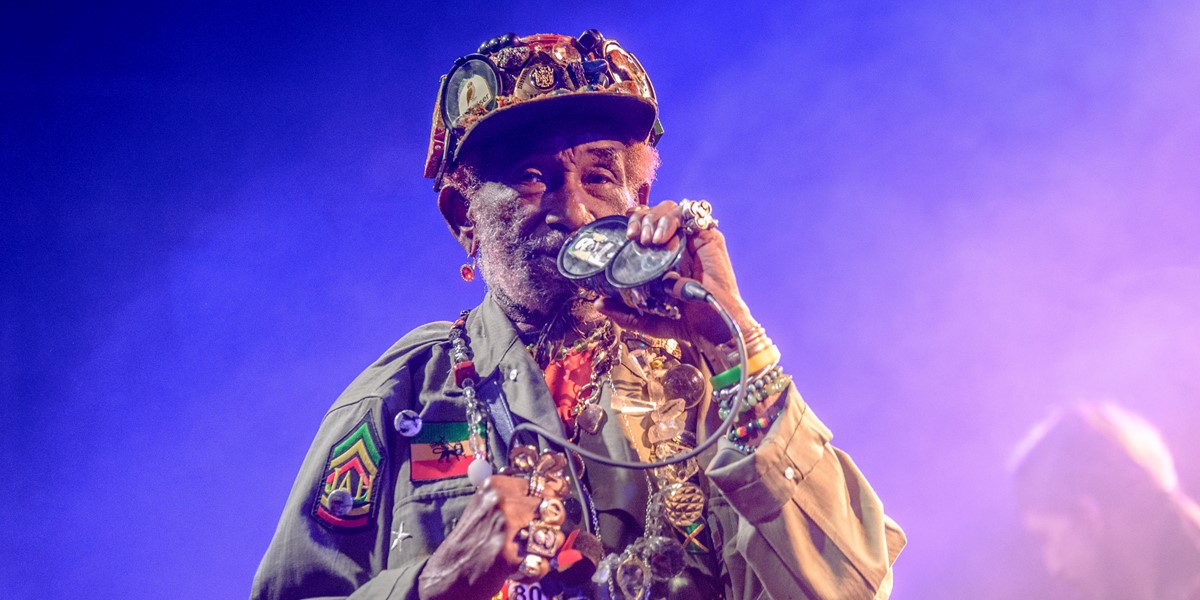Tuesday, August 31, 2021
Obituary: Lee 'Scratch' Perry (1936-2021)
By David Katz
The Jamaican record producer and singer famed for his innovative studio alchemy is remembered

Lee 'Scratch' Perry in 2016 (©pitpony.photography/CC-BY-SA-3.0)
The death of Lee ‘Scratch’ Perry at the age of 85 marks the end of an era for popular music. Through the innovative recording techniques, he developed during the 1960s and 70s, Perry indelibly changed the way that music was recorded and disseminated, with dramatic repercussions for those working in other genres. His reuse of previously recorded master tapes was unprecedented, and it is telling that his song ‘Return of Django’, which hit the number five position on the UK pop charts in late 1969, was a failed cover version, causing him to remove the substandard vocal to render the song a rousing saxophone instrumental, yielding the first of many significant international hits.
Perry was raised in a remote village in Hanover, north-west Jamaica. His father was a road contractor and in addition to working the local sugarcane fields, Perry’s mother practiced Ettu, a Yoruba form of communication with departed ancestral spirits, installing a belief in an interactive spirit realm that Perry maintained his entire life.
After finding fame at dance tournaments and domino competitions, Perry bluffed his way into road construction work, helping develop the Negril area for tourism in the late 1950s. While bulldozing roads and dynamiting rocks, divine voices directed him to Kingston, where his approaches to producer Duke Reid resulted in his lyrics being used without permission, prompting a shift of allegiance to the camp of Clement ‘Sir Coxsone’ Dodd, who would shortly form Studio One, Jamaica’s premier recording facility. Between 1961-66, Perry recorded dozens of sides for Dodd, bringing Toots & the Maytals to his attention and working as an uncredited co-producer with organist Jackie Mittoo.
Following a freelance period working with Prince Buster, Joe Gibbs and Clancy Eccles in 1968, Perry scored a big hit in Jamaica with ‘People Funny Boy’, a song of financial disappointments and grudges, illustrated by a crying baby lifted from a sound-effects record. The song’s unusual, off-kilter rhythm, inspired by a pocomania church service, helped the new reggae style come into being. Then, after the success of 'Return of Django' brought him and his Upsetters band to the UK to tour, Perry worked with Bob Marley & the Wailers between 1969-71, totally transforming their sound, preparing them for the international stardom they would go on to achieve with Island Records. His relationship with Marley was uncommonly close; Marley lived for a long period in the front room of Perry’s home, and their teacher-student relationship lasted for the rest of Marley’s life.
In 1973, Perry opened his own rudimentary four-track studio at his home on the outskirts of Kingston, known as the Black Ark, where Perry helped the dub art form to come into being through experimentation with reverb, echo, delay and other effects. That he produced Junior Murvin’s ‘Police and Thieves’, Max Romeo’s ‘War in a Babylon’, George Faith’s ‘I’ve Got the Groove’ and his own dub masterwork Super Ape on a Teac 4-track is simply astounding, such were the complexity of the recordings, which have evidenced enduring appeal.
The Black Ark was also the focal point for a radical subsect of the Rastafari faith, but while working with the Congos harmony trio, Perry fell out with everyone, had a breakdown and underwent a dramatic transformation, all against the backdrop of the internecine political strife of late 1970s Jamaica. Afterwards he became the wandering nomad who produced music of varying quality in different lands, his stage shows ranging from the sublime to the ridiculous.
Since the mid-1980s, his work with Adrian Sherwood was marked by consistently high standards, as heard on their final collaboration, Rainford, and its dub companion, Heavy Rain, which topped the Billboard reggae charts. He also released strong work with producer Mad Professor, his US touring band Subatomic Sound System and Daniel Boyle. Perry was also the subject of two documentary films and in later years exhibited his paintings and sculpture, the latter often made with found objects. We are unlikely to encounter anyone remotely similar again.

